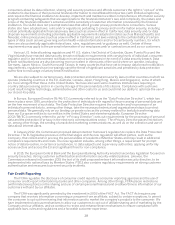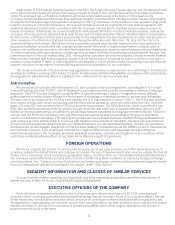American Express 2015 Annual Report Download - page 32
Download and view the complete annual report
Please find page 32 of the 2015 American Express annual report below. You can navigate through the pages in the report by either clicking on the pages listed below, or by using the keyword search tool below to find specific information within the annual report.
SUPERVISION AND REGULATION
Overview
Federal and state banking laws, regulations and policies extensively regulate the Company, TRS, Centurion Bank
and American Express Bank. They prescribe standards relating to, among other things, capital, earnings, liquidity,
stress tests, resolution planning, dividends, the repurchase or redemption of shares, loans or extension of credit to
affiliates and insiders, corporate governance, internal controls, information systems, risk management, internal audit
systems, compensation, loan documentation, credit underwriting, asset growth and impaired assets. Such laws,
regulations and policies are intended primarily for the protection of our depositors and other customers and the
federal deposit insurance funds, as well as to minimize systemic risk, and not for the protection of our shareholders or
other creditors. The costs of compliance with this extensive regulatory regime are substantial. In recent years, the
financial services industry has been subject to rigorous examination scrutiny, high regulatory expectations, and a
stringent and unpredictable regulatory enforcement environment. American Express Company and TRS are bank
holding companies and financial holding companies under the BHC Act. As bank holding companies under the BHC
Act, American Express Company and TRS are subject to supervision and examination by the Federal Reserve. Under
the system of “functional regulation” established under the BHC Act, the Federal Reserve supervises the Company,
including all its non-bank subsidiaries, as an “umbrella regulator” of the consolidated organization and generally defers
to the primary U.S. regulators of the Company’s U.S. bank subsidiaries with respect to the supervision and regulation
of those institutions. Banking regulators have broad examination and enforcement power over bank holding
companies and their subsidiaries, including the power to impose substantial fines, limit dividends and other capital
distributions, restrict operations and acquisitions and require divestitures. Bank holding companies and banks, as well
as subsidiaries of both, are prohibited by law from engaging in practices that the relevant regulatory authority deems
unsafe or unsound (which such authorities generally interpret broadly). We are also subject to supervision,
examination and enforcement by the CFPB with respect to marketing and sale of consumer financial products and
compliance with certain federal consumer financial laws, including, among other laws, the CFPA and the TILA.
Many aspects of our business also are subject to rigorous regulation by other U.S. federal and state regulatory
agencies and securities exchanges and by non-U.S. government agencies or regulatory bodies. To the extent that
different regulatory systems impose overlapping or inconsistent requirements on the conduct of our business, we face
complexity and additional costs in our compliance efforts. New laws or regulations or changes to existing laws and
regulations (including changes in interpretation or enforcement), as well as the enforcement of both existing and new
laws and regulations, could materially adversely affect our financial condition or results of operations. In addition to the
discussion in this section, see “Risk Factors — Legal and Regulatory Risks” for a further discussion of the potential
impact legislative and regulatory changes may have on our results of operations and financial condition.
See also “Card-Issuing Business and Deposit Programs — Regulation” under “U.S. Card Services,” “International
Card Services — Regulation,” “Global Commercial Services — Regulation” and “Global Network & Merchant
Services — Regulation” for a discussion of certain regulatory considerations specifically applicable to our business
segments.
Financial Holding Company and Bank Holding Company Status and Activities
The BHC Act limits the non-banking activities of bank holding companies. The activities of bank holding
companies that are not “financial holding companies” are restricted to those activities that the Federal Reserve has
determined are “so closely related to banking as to be a proper incident thereto.” An eligible bank holding company
may elect to become a financial holding company, which is authorized to engage in a broader range of financial and
related activities. As a financial holding company, American Express engages in various activities permissible only for a
financial holding company including, in particular, providing travel agency services, acting as a finder and engaging in
certain insurance underwriting and agency services.
For a bank holding company to be and remain eligible for financial holding company status, the bank holding
company and each of its subsidiary U.S. depository institutions must be “well capitalized” and “well managed,” and
each of its subsidiary U.S. depository institutions must have received at least a “satisfactory” rating on its most recent
assessment under the Community Reinvestment Act of 1977 (the “CRA”). If the bank holding company fails to meet
applicable standards for financial holding company status, it is likely to be barred from engaging in new types of
financial activities or making certain types of acquisitions or investments in reliance on its status as a financial holding
company, and ultimately could be required to either discontinue the broader range of activities permitted to financial
holding companies or divest its subsidiary U.S. depository institutions.
Acquisitions and Investments
Applicable federal and state laws place limitations on the ability of persons to invest in or acquire control of us
without providing notice to or obtaining the approval of one or more of our regulators. In addition, we are subject to
banking laws and regulations that limit our investments and acquisitions and, in some cases, subject them to the prior
review and approval of our regulators, including the Federal Reserve, the OCC and the FDIC. The banking agencies have
broad discretion in evaluating proposed acquisitions and investments that are subject to their prior review or approval.
21
























